外研版2019选择性必修第四册Unit 2 Lessons in life Period 2 Using language 课件(共24张)
文档属性
| 名称 | 外研版2019选择性必修第四册Unit 2 Lessons in life Period 2 Using language 课件(共24张) | 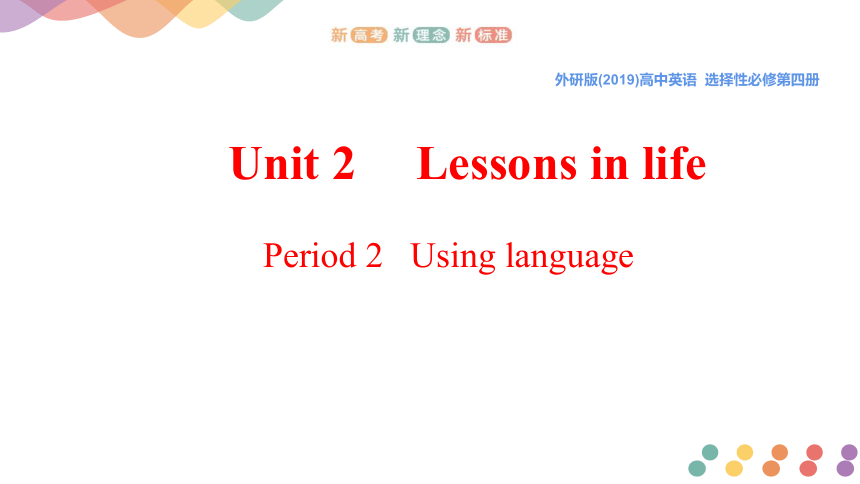 | |
| 格式 | zip | ||
| 文件大小 | 14.2MB | ||
| 资源类型 | 教案 | ||
| 版本资源 | 外研版(2019) | ||
| 科目 | 英语 | ||
| 更新时间 | 2022-08-29 20:24:00 | ||
图片预览

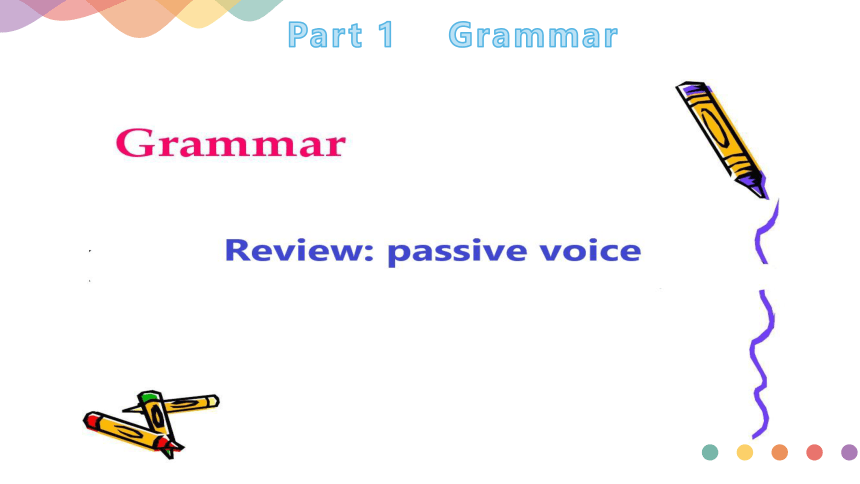
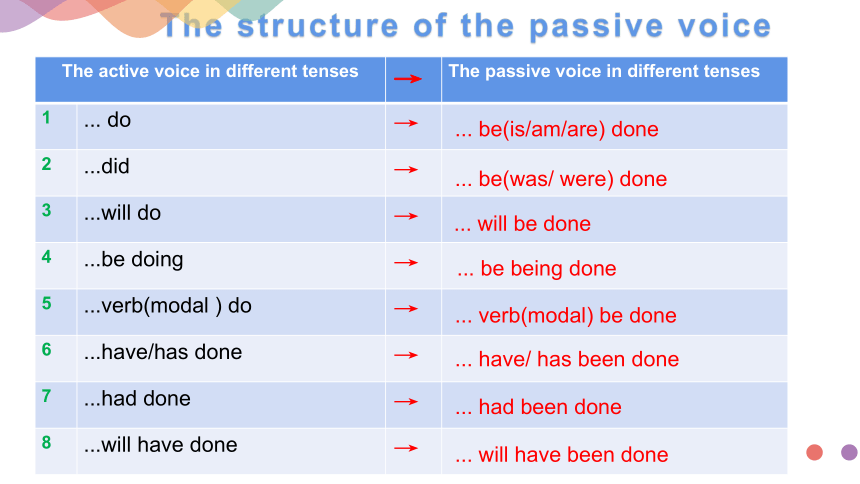
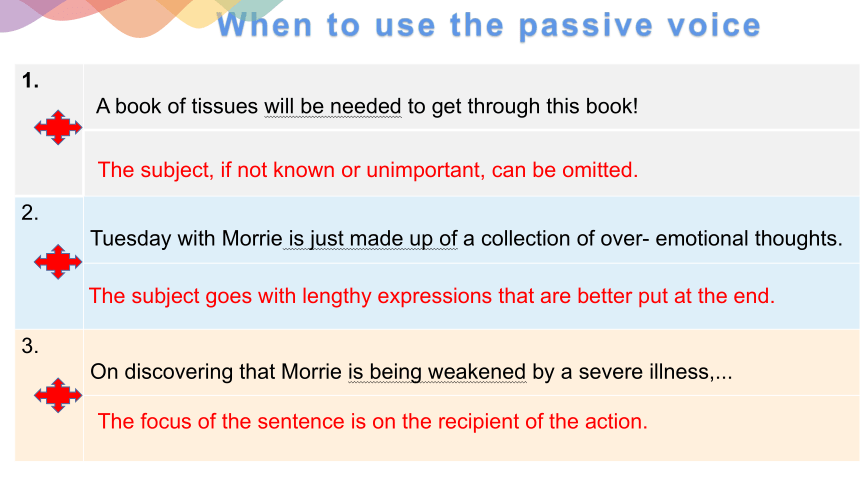
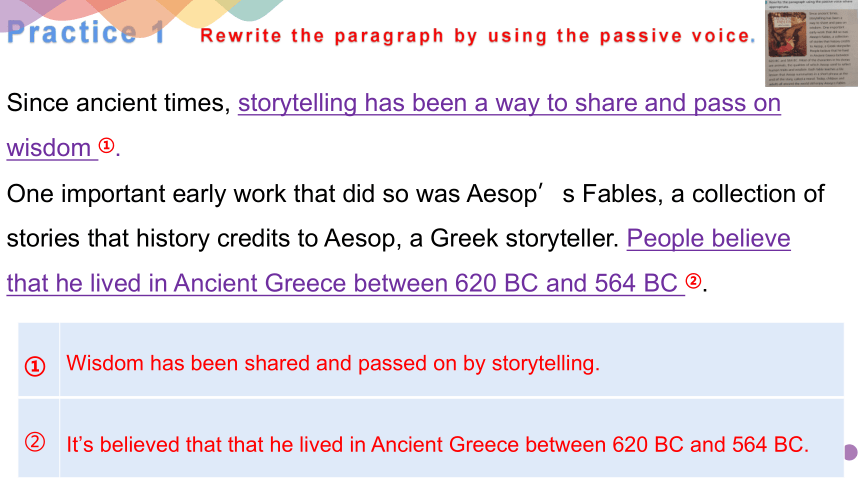
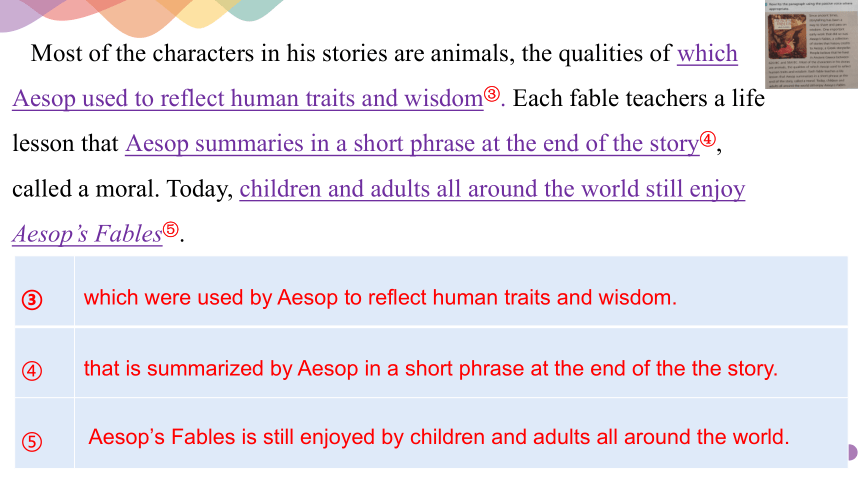
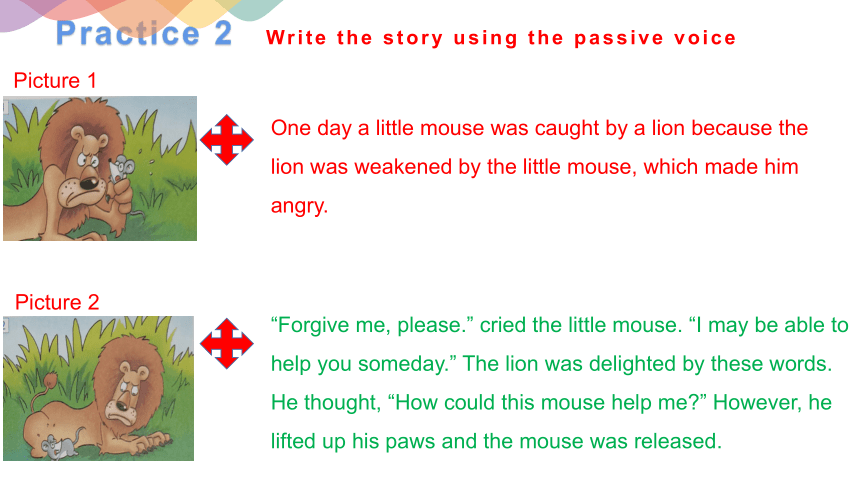
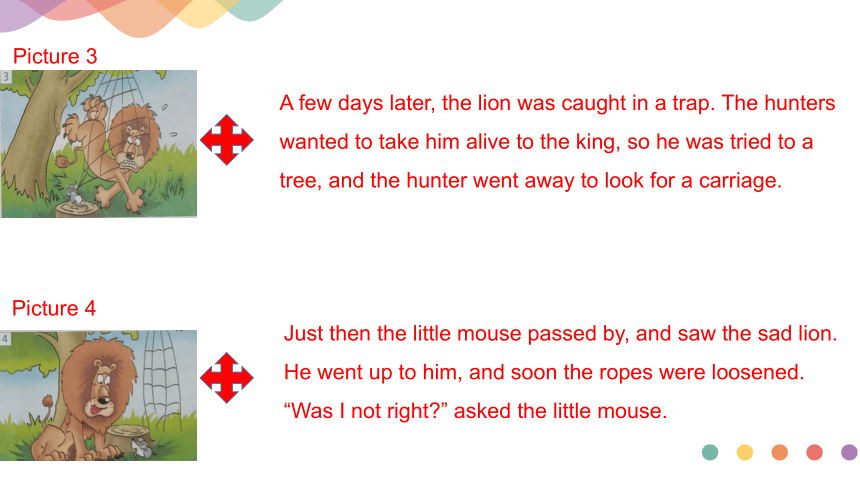
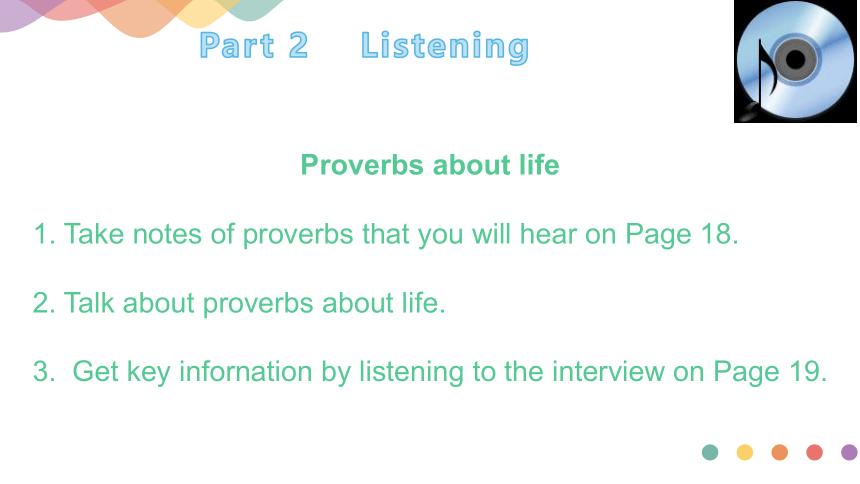
文档简介
(共24张PPT)
外研版(2019)高中英语 选择性必修第四册
Unit 2 Lessons in life
Period 2 Using language
Part 1 Grammar
The structure of the passive voice
The active voice in different tenses → The passive voice in different tenses
1 ... do →
2 ...did →
3 ...will do →
4 ...be doing →
5 ...verb(modal ) do →
6 ...have/has done →
7 ...had done →
8 ...will have done →
... be(is/am/are) done
... be(was/ were) done
... will be done
... be being done
... verb(modal) be done
... have/ has been done
... had been done
... will have been done
When to use the passive voice
1.
A book of tissues will be needed to get through this book!
2.
Tuesday with Morrie is just made up of a collection of over- emotional thoughts.
3.
On discovering that Morrie is being weakened by a severe illness,...
The subject, if not known or unimportant, can be omitted.
The subject goes with lengthy expressions that are better put at the end.
The focus of the sentence is on the recipient of the action.
Practice 1 Rewrite the paragraph by using the passive voice.
Since ancient times, storytelling has been a way to share and pass on wisdom ①.
One important early work that did so was Aesop’s Fables, a collection of stories that history credits to Aesop, a Greek storyteller. People believe that he lived in Ancient Greece between 620 BC and 564 BC ②.
①
②
Wisdom has been shared and passed on by storytelling.
It’s believed that that he lived in Ancient Greece between 620 BC and 564 BC.
Most of the characters in his stories are animals, the qualities of which Aesop used to reflect human traits and wisdom③. Each fable teachers a life lesson that Aesop summaries in a short phrase at the end of the story④, called a moral. Today, children and adults all around the world still enjoy Aesop’s Fables⑤.
③
④
⑤
which were used by Aesop to reflect human traits and wisdom.
that is summarized by Aesop in a short phrase at the end of the the story.
Aesop’s Fables is still enjoyed by children and adults all around the world.
Practice 2 Write the story using the passive voice
One day a little mouse was caught by a lion because the lion was weakened by the little mouse, which made him angry.
Picture 1
Picture 2
“Forgive me, please.” cried the little mouse. “I may be able to help you someday.” The lion was delighted by these words. He thought, “How could this mouse help me ” However, he lifted up his paws and the mouse was released.
Picture 3
Picture 4
A few days later, the lion was caught in a trap. The hunters wanted to take him alive to the king, so he was tried to a tree, and the hunter went away to look for a carriage.
Just then the little mouse passed by, and saw the sad lion. He went up to him, and soon the ropes were loosened. “Was I not right ” asked the little mouse.
Part 2 Listening
Proverbs about life
1. Take notes of proverbs that you will hear on Page 18.
2. Talk about proverbs about life.
3. Get key infornation by listening to the interview on Page 19.
Proverbs about life
Listening Ⅰ
1 A: Professor Brown, here’s my term paper. Sorry for the delay.
B: That’s OK. __________________________, right
2 A: Maths is really killing me! I’m thinking of giving it up.
B: ______________________ You’ll never get your dream job as a market analyst if you don’t stick it.
3 A: If you want to lose weight, you need to stop eating junk food, and you need to start exercising.
B: OK. I’ll start tomorrow... maybe.
A: Today. Not tomorrow. ____________________________________________
Better late than never.
No pains, no gains.
Never put off until tomorrow what you can do today.
Proverbs about life
4 A: I’m glad you finally got here.
B: My car had a flat tyre on the way. Anyway.
__________________________.
5 A: With my brother’s help, I finally completed my biology project!
B: Congratulations!_____________________________.
6 A: I heard that Mary is going to invest all her money in this programme.
B: That’s not wise. As people usually say, _________________________________
All’s well that ends well.
Two heads are better one.
Don’t put all of your eggs in one basket.
Paraphrase “proverbs about life”
You must face challenges in order to be successful.
It’s easier to achieve something if you cooperate with someone else.
Doing something late is better than not doing it at all.
No pains, no gains.
Two heads are better one.
Better late than never.
Paraphrase “proverbs about life”
You should start things earlier rather than later
Do not put all your efforts or resources into doing one thing.
Problems don’t matter if the final result is good.
Never put off until tomorrow what you can do today.
Don’t put all of your eggs in one basket.
All’s well that ends well.
Post-listening
More Chinese proverbs
“A slow sparrow should make an early start”
Possible answer:
When you feel that you are not as good at something as others, but you want to go ahead of others, you are supposed to make an earlier start and spend two or three times as much time and effort as others, in which way you can also be successful.
Voice your opinion: Think of a siutaion to which the proverb can be applied
Janet Rose: the oldest university graduate
Listening‖
The best headline for the interview
Listening‖
A. University Fees are No Barrie to Grandma!
B. Dream Come True for Graduating Grandma
C. Jane Says: “Family first!” That’s what matters!”
D. How the Students Experience Has Changed with the Centuries
Answer: D
Interview with Janet Rose
1 Age:
2 First attended university in:
3 Reason for leaving university:
4 Reason for going back to university:
81
1955
She took care of her ill mother and helped her father.
Her daughter suggested she go back to school five years ago and she jumped at the chance.
Interview with Janet Rose
5 Initial feelings on returning to university:
6 University major:
7 Feeling on graduation:
8 Advice to others:
9 Future plans:
She felt nervous at first and she felt so old.
American literature
She feels great.
You are never too old to learn.
Starting a master’s degree.
How to talk about experiences and give advice
1. I start... back in.. 2. After that I ... 3. But then five years ago
4. I felt... at first. 5. I suggest that... 6. Remember,...
Talking about experiences Giving advice
1/ 2/ 3/ 4
5/ 6
Language appreciation
1. Recently, there has been an increase in the number of mature students going to university after working for a few or many years.
[句式分析] 现在分词短语 “going to university” 充当名词students的后置定语,相当于定语从句who are going to university. 而现在分词短语 “after working for a few or many years” 在本语境中充当时间状语,相当于时间状语从句after they worked for a few or many years.
[尝试翻译] 最近,有越来越多的成年学生在工作几年后去上大学。
Language appreciation
2. In China, a man from Jiangsu Province graduated from university at the age of 88, making him the oldest university graduate in the country.
[句式分析] 现在分词短语 “making him the oldest university graduate in the country”, 在本语境中充当“伴随状语”;而且采用“make + 宾语(him) + 宾语补足语(the old ....the country)”复合结构。
[尝试翻译] 在中国,江苏一名男子以88岁的高龄大学毕业,成为中国年龄最大的大学毕业生。
Key words and phrases
1 phrase: 7 come true:
2 cooperate: 8 passive:
3 fee: 9 fable:
4 university fees: 10 omit:
5 rather than: 11 lengthy:
6 put...into... 12 credit to:
Assignments for this period
1. Review the vocabulary and the language ponits of the text.
2. Listen to the proverbs and the the interivew with Janet Rose again.
3. Write a short passage about your own experiences to illustrate your understanding of the proverb “Never too late to learn ”.
外研版(2019)高中英语 选择性必修第四册
Unit 2 Lessons in life
Period 2 Using language
Part 1 Grammar
The structure of the passive voice
The active voice in different tenses → The passive voice in different tenses
1 ... do →
2 ...did →
3 ...will do →
4 ...be doing →
5 ...verb(modal ) do →
6 ...have/has done →
7 ...had done →
8 ...will have done →
... be(is/am/are) done
... be(was/ were) done
... will be done
... be being done
... verb(modal) be done
... have/ has been done
... had been done
... will have been done
When to use the passive voice
1.
A book of tissues will be needed to get through this book!
2.
Tuesday with Morrie is just made up of a collection of over- emotional thoughts.
3.
On discovering that Morrie is being weakened by a severe illness,...
The subject, if not known or unimportant, can be omitted.
The subject goes with lengthy expressions that are better put at the end.
The focus of the sentence is on the recipient of the action.
Practice 1 Rewrite the paragraph by using the passive voice.
Since ancient times, storytelling has been a way to share and pass on wisdom ①.
One important early work that did so was Aesop’s Fables, a collection of stories that history credits to Aesop, a Greek storyteller. People believe that he lived in Ancient Greece between 620 BC and 564 BC ②.
①
②
Wisdom has been shared and passed on by storytelling.
It’s believed that that he lived in Ancient Greece between 620 BC and 564 BC.
Most of the characters in his stories are animals, the qualities of which Aesop used to reflect human traits and wisdom③. Each fable teachers a life lesson that Aesop summaries in a short phrase at the end of the story④, called a moral. Today, children and adults all around the world still enjoy Aesop’s Fables⑤.
③
④
⑤
which were used by Aesop to reflect human traits and wisdom.
that is summarized by Aesop in a short phrase at the end of the the story.
Aesop’s Fables is still enjoyed by children and adults all around the world.
Practice 2 Write the story using the passive voice
One day a little mouse was caught by a lion because the lion was weakened by the little mouse, which made him angry.
Picture 1
Picture 2
“Forgive me, please.” cried the little mouse. “I may be able to help you someday.” The lion was delighted by these words. He thought, “How could this mouse help me ” However, he lifted up his paws and the mouse was released.
Picture 3
Picture 4
A few days later, the lion was caught in a trap. The hunters wanted to take him alive to the king, so he was tried to a tree, and the hunter went away to look for a carriage.
Just then the little mouse passed by, and saw the sad lion. He went up to him, and soon the ropes were loosened. “Was I not right ” asked the little mouse.
Part 2 Listening
Proverbs about life
1. Take notes of proverbs that you will hear on Page 18.
2. Talk about proverbs about life.
3. Get key infornation by listening to the interview on Page 19.
Proverbs about life
Listening Ⅰ
1 A: Professor Brown, here’s my term paper. Sorry for the delay.
B: That’s OK. __________________________, right
2 A: Maths is really killing me! I’m thinking of giving it up.
B: ______________________ You’ll never get your dream job as a market analyst if you don’t stick it.
3 A: If you want to lose weight, you need to stop eating junk food, and you need to start exercising.
B: OK. I’ll start tomorrow... maybe.
A: Today. Not tomorrow. ____________________________________________
Better late than never.
No pains, no gains.
Never put off until tomorrow what you can do today.
Proverbs about life
4 A: I’m glad you finally got here.
B: My car had a flat tyre on the way. Anyway.
__________________________.
5 A: With my brother’s help, I finally completed my biology project!
B: Congratulations!_____________________________.
6 A: I heard that Mary is going to invest all her money in this programme.
B: That’s not wise. As people usually say, _________________________________
All’s well that ends well.
Two heads are better one.
Don’t put all of your eggs in one basket.
Paraphrase “proverbs about life”
You must face challenges in order to be successful.
It’s easier to achieve something if you cooperate with someone else.
Doing something late is better than not doing it at all.
No pains, no gains.
Two heads are better one.
Better late than never.
Paraphrase “proverbs about life”
You should start things earlier rather than later
Do not put all your efforts or resources into doing one thing.
Problems don’t matter if the final result is good.
Never put off until tomorrow what you can do today.
Don’t put all of your eggs in one basket.
All’s well that ends well.
Post-listening
More Chinese proverbs
“A slow sparrow should make an early start”
Possible answer:
When you feel that you are not as good at something as others, but you want to go ahead of others, you are supposed to make an earlier start and spend two or three times as much time and effort as others, in which way you can also be successful.
Voice your opinion: Think of a siutaion to which the proverb can be applied
Janet Rose: the oldest university graduate
Listening‖
The best headline for the interview
Listening‖
A. University Fees are No Barrie to Grandma!
B. Dream Come True for Graduating Grandma
C. Jane Says: “Family first!” That’s what matters!”
D. How the Students Experience Has Changed with the Centuries
Answer: D
Interview with Janet Rose
1 Age:
2 First attended university in:
3 Reason for leaving university:
4 Reason for going back to university:
81
1955
She took care of her ill mother and helped her father.
Her daughter suggested she go back to school five years ago and she jumped at the chance.
Interview with Janet Rose
5 Initial feelings on returning to university:
6 University major:
7 Feeling on graduation:
8 Advice to others:
9 Future plans:
She felt nervous at first and she felt so old.
American literature
She feels great.
You are never too old to learn.
Starting a master’s degree.
How to talk about experiences and give advice
1. I start... back in.. 2. After that I ... 3. But then five years ago
4. I felt... at first. 5. I suggest that... 6. Remember,...
Talking about experiences Giving advice
1/ 2/ 3/ 4
5/ 6
Language appreciation
1. Recently, there has been an increase in the number of mature students going to university after working for a few or many years.
[句式分析] 现在分词短语 “going to university” 充当名词students的后置定语,相当于定语从句who are going to university. 而现在分词短语 “after working for a few or many years” 在本语境中充当时间状语,相当于时间状语从句after they worked for a few or many years.
[尝试翻译] 最近,有越来越多的成年学生在工作几年后去上大学。
Language appreciation
2. In China, a man from Jiangsu Province graduated from university at the age of 88, making him the oldest university graduate in the country.
[句式分析] 现在分词短语 “making him the oldest university graduate in the country”, 在本语境中充当“伴随状语”;而且采用“make + 宾语(him) + 宾语补足语(the old ....the country)”复合结构。
[尝试翻译] 在中国,江苏一名男子以88岁的高龄大学毕业,成为中国年龄最大的大学毕业生。
Key words and phrases
1 phrase: 7 come true:
2 cooperate: 8 passive:
3 fee: 9 fable:
4 university fees: 10 omit:
5 rather than: 11 lengthy:
6 put...into... 12 credit to:
Assignments for this period
1. Review the vocabulary and the language ponits of the text.
2. Listen to the proverbs and the the interivew with Janet Rose again.
3. Write a short passage about your own experiences to illustrate your understanding of the proverb “Never too late to learn ”.
